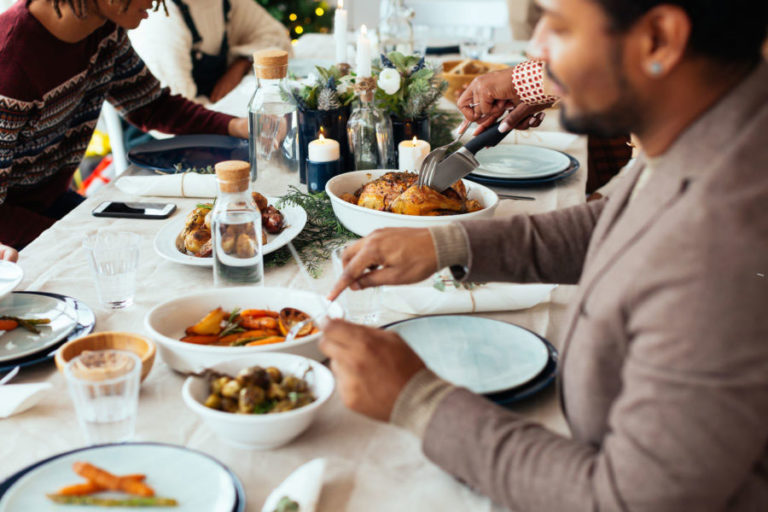
Image by BONNINSTUDIO/Stocksy, © All Rights Reserved.
How To Talk With Your Relatives Over the Holidays
Are you dreading the holidays because you do not want to talk to your relatives about politics? Most people don’t focus that much on politics, but these days even those who rarely express an opinion are doing so. You may worry that the dinner table conversation will escalate and end in shouting or tears. No wonder so many people tell me that they feel more anxious than usual about the holidays.
I wanted to share some thoughts about approaching the event in a way that establishes a chance for family harmony. Or, at a minimum, no hurled objects.
Prepare by starting from a place of love. If you are agitated about the holidays, this may be a tough place to arrive in, especially if you have unresolved issues beyond politics with some members of your family. In every family there are people who annoy and upset us, but for the most part our family are people we love (even if we don’t like them). In my book Real Love I focus on a love you generate and that can emanate from within you. Love as an action, rather than as something you yearn for someone to give to you. You can be the source of love and stability, and an agent of harmony at this gathering, simply by extending the act of love that is listening.
Listening to another person is intimate and graceful. To listen, you quiet yourself and open to the truth of another in the way they look and as well as the words they choose. To take in another fully, you drop your defenses and attempt to see the world from the other person’s point of view rather than just waiting for them to stop talking so you can make your point.
I understand that you might feel this makes you vulnerable and may even frighten you. In surrendering the space between you to the other person we appear to give up control. The prospect of allowing this person you disagree with to rant on without you answering back is frustrating. What’s the point of talking at all if you are not going to get to rebut their arguments? To me, listening is brave and springs from a deep well of generosity. This is why so few people are capable of it, and why doing so demonstrates strength.
We are listening to understand the other person, not to win the argument. We want to know how they have come to their conclusions, what emotions drive those ideas, and in doing so understand how they construct their point of view. We hear often these days that we should talk to people with whom we disagree politically because as a country we need to try to find common ground. For most of us that’s not easy to do, nor is it easy to find someone to talk with whom you respect. Most of us don’t know many people we disagree with because the world we’ve selected for ourselves is one of people who share our views.
A friend whose three siblings voted in the last election in a way that startled and appalled him told me he came to consider himself fortunate to have family members who hold different opinions than he does. Last holiday season they got together and he said he imagined it might be the only household in the U.S. where the word “Trump” wasn’t uttered. They didn’t dare go there. This next year he wants to try. He believes the effort to have a civil discussion might help him understand why this country is so fractured these days.
A woman in a class I taught was describing how much she dreaded Thanksgiving but ended on a little note of hope. “I remember I love my nephew and when he was a little boy we were very close.” A man I spoke with described a similar complication with his older brother with whom he disagreed profoundly about abortion and climate change. “My brother saved me from drowning when I was seven. I know he is a decent guy. I know he loves me.” This is the place of common ground. Try to see a complete picture of those you oppose, one that includes the positive qualities, because this forms a good foundation for hearing each other.
In getting ready for the family gathering, check in with yourself to understand the emotions you are carrying within you about this. As you anticipate talking with these relatives, your heart rate may increase and the pace of your thoughts may quicken. Do you imagine telling this person once-and-for-all what you think? Have you rehearsed cutting remarks you imagine will shut them up? Do you think of this person condescendingly, that they are stupid, a jerk, or even immoral? These are signs that you are not ready to listen. If you do not want to listen, there’s no point to interacting. Accept that, but also examine it to see what it reveals about your part in this rupture. Use evasive action when you are near this person so that you don’t get triggered into an argument. When you are ready to hear the other person, you are ready to locate common ground.
To really listen you come to the exchange from a viewpoint of curiosity, not judgment. You do not need to lead with emotion. It is not necessary to let the other person know how you feel. The best approach is to ask questions.
If you end up in a heated exchange, despite your preparations, remind yourself that you do not have to win. It’s fine to respond with, “I just don’t see it that way.” Or, “Too bad we don’t agree on the facts.” Know that this does not have to be your last conversation. You will see this person again, and in that gap you can consider what was said and try a new approach.
I’ve seen that I can learn a tremendous amount by listening with my heart as well as with my brain. One woman told me when she was centered enough to listen to her grandmother describe her views she felt her grandma’s yearning for a simpler time, and she had empathy for that feeling. Another told me when he listened to his aggressive, militaristic father-in-law who never found a war he did not want to escalate, he heard fear. This did not mean he agreed with his father-in-law’s views, but it helped him to understand him better, and to have compassion for him, something he’d not had before.
Wait, you might say; some people are genuinely terrifying. People have said to me, “Why should I want a civil conversation with someone who doesn’t believe I should exist, because I’m trans, or black, or whatever.” “They want to kill me.” “They have opinions that are so horrible and vile, I could never talk to them.” What can I say, except, I hear you. I wish we lived in a time where I could then respond by glibly saying, “Let’s not get overly dramatic.” But there are dangerous people like that and always have been. They seem to me to be louder right now.
Even if I were the most privileged person on the planet, able to avoid a whole lot, it is a moment in time where people are marching in U.S. cities with Nazi flags. That scares me. My own inherited trauma won’t let me stop at just the efforts to have civil conversations. In my next column on listening I’ll take a look at relating to people who have views I find repugnant and frightening and with whom I can’t imagine standing on common ground.


Share your reflection